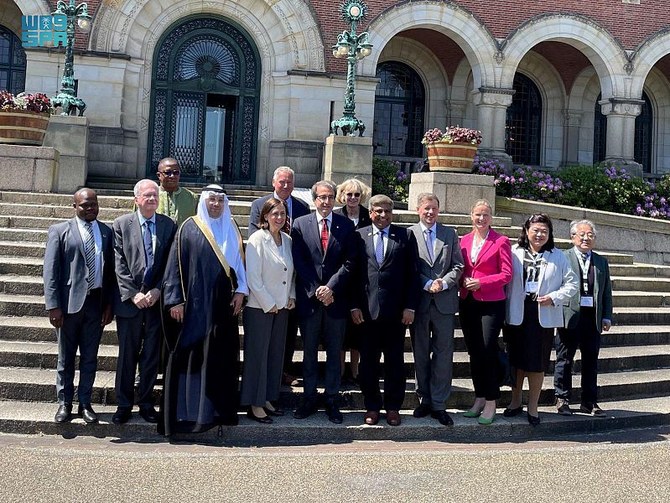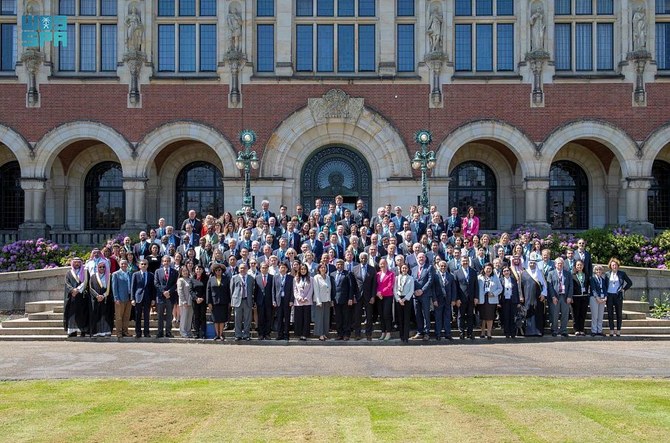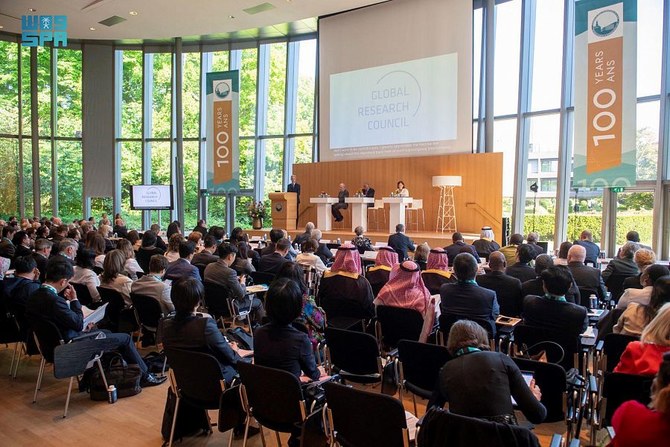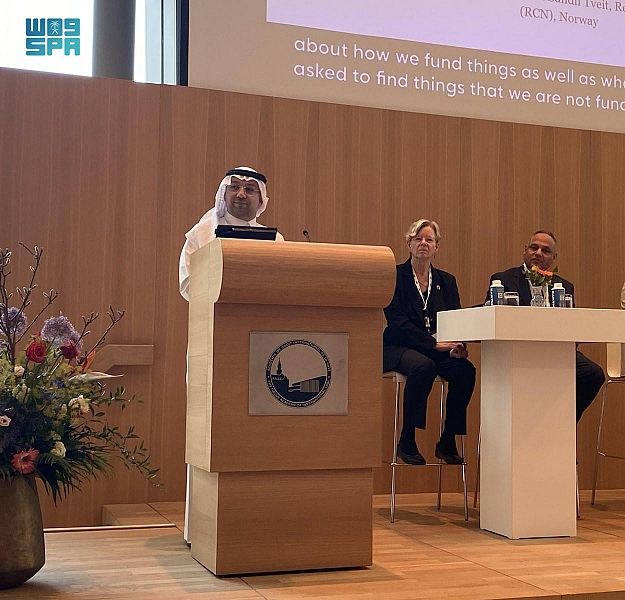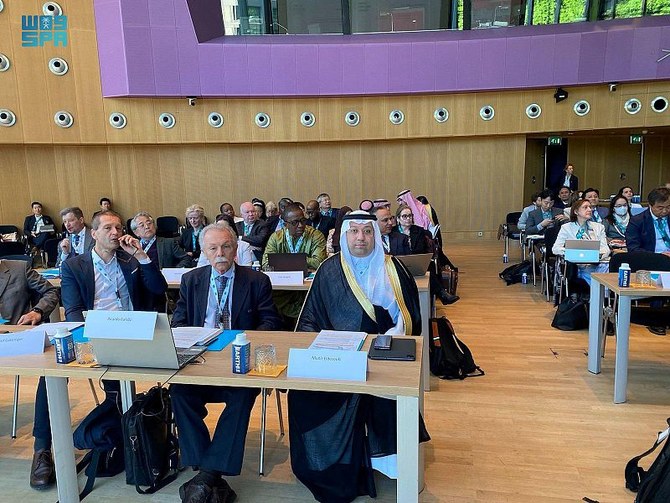RIYADH: Saudi Arabia has been re-elected to represent the Middle East and North Africa region on the governing board of the Global Research Council during its 11th annual meeting in The Hague, The Netherlands, the Saudi Press Agency reported on Saturday.
The President of King Abdulaziz City for Science and Technology, Dr. Munir Eldesouki, will continue to represent Saudi Arabia at the GRC and his re-election reaffirms the Kingdom’s prominent position in the scientific and research fields and its commitment to enhancing joint cooperation among research centers in the MENA region.
This achievement is also a testament to the unwavering support of King Salman and Crown Prince Mohammed bin Salman, who is head of the Higher Committee of Research, Development and Innovation.
During the annual meeting, which took place from May 29 to June 2, Eldesouki chaired a meeting of the heads of research councils from the MENA region and participated in a panel discussion on the funding of climate change research, in which the participants endorsed a statement to strengthen international cooperation, research outputs, scientific communication, financing strategies, taking into account social and economic conditions, local cultures and knowledge, capacity building in science, innovation and entrepreneurship, and identifying best practices.
Eldesouki, who is also the general supervisor of the founding team of the Research, Development and Innovation Authority, met with a number of heads of international research councils from Singapore, Canada, the US, Turkiye, Britain and Germany to discuss areas of cooperation on the sidelines of the annual meeting.
The Kingdom presented a working paper on the challenges and opportunities faced by the research councils in the MENA region and the delegation participated in a number of other key meetings, including the council’s executive committee, the international consultative committee, and the working groups concerned with equality, diversity and inclusion, responsible evaluation of research, and international multilateral funding.
Saudi Arabia has played a pivotal role in the GRC’s work since its establishment in 2012, including strengthening cooperation between research funding institutions, exchanging best practices and expertise in supporting scientific research, and exploring ways to support the scientific community across the world.
The Kingdom currently occupies the position of vice-chair of the GRC’s board of governors and also represents the regional research councils of the MENA region on the board, as well as on the executive committee.
Global Research Council re-elects Saudi Arabia as MENA region chair
https://arab.news/m96be
Global Research Council re-elects Saudi Arabia as MENA region chair

- The decision came during the 11th annual meeting of the Global Research Council in The Hague
- The Kingdom presented a working paper on the challenges and opportunities faced by the research councils in the MENA region
Saudi king, crown prince congratulate Montenegro and Kiribati on their special days

- Saudi Arabia leaders wish 2 nations’ people good health, progress and prosperity
JEDDAH: Saudi Arabia’s king and crown prince on Sunday congratulated President Jakov Milatovic of Montenegro on his country’s National Day celebrations.
In a cable, King Salman wished Milatovic “continued good health and happiness, and the government and people of Montenegro steady progress and prosperity,” the Saudi Press Agency reported.
Crown Prince Mohammed bin Salman sent a similar message in a separate cable, according to the SPA.
On Saturday, the king and crown prince congratulated Kiribati’s President Taneti Maamau on his country’s Independence Day, wishing him and his constituents steady progress and prosperity.
Montenegro, located in southeast Europe, became a part of Yugoslavia in 1918 during the realignment of nations after the First World War.
After Yugoslavia broke up in 1992, Montenegro formed a federation with Serbia, but opted to become an independent republic in 2006.
Kiribati, an island republic in the central Pacific, gained its independence from the UK in 1979.
Both Montenegro and Kiribati are members of the UN.
Saudi artist rolls forward with bamboo paper

- Jumanah Telity’s eco-conscious art form is as durable as it is creative
JEDDAH: Saudi artist Jumanah Telity has found an unusual medium for her creativity: bamboo paper.
Through a labor-intensive process she transforms it into sturdy objects, from baskets and storage boxes to small-scale furniture and figurines.
“This art, like any other art, requires specific techniques, sense, and artistic thought to produce creativity,” she told Arab News. “It differs from other arts in that it is a very strong and practical product that is used daily and also decoratively.”

Originally an educator, Telity spent 19 years in schools, eventually serving as a principal.
In 2020, during the COVID-19 pandemic, she decided to explore her long-time fascination with natural materials such as wood, bamboo, and rattan.
That is when she discovered bamboo paper weaving online and something clicked.
HIGHLIGHTS
• In 2020, Saudi artist Jumanah Telity decided to explore her long-time fascination with natural materials such as wood, bamboo, and rattan.
• She recently displayed her work at Balad Al-Fann in Jeddah’s historic district.
“It strangely attracted me. I felt like I found my passion here because it really appealed to me,” she said.
Telity says the method involves tightly rolling paper into sticks using a special needle. It is then woven into shape.

“It begins with choosing the type of paper, its size, and the way it is cut,” she said. “After trying this art, you’ll be amazed at the strength of these products and how they can be washed with soap and water without being affected.”
She describes the art as eco-conscious because of the recycling involved in the process.
To hone her craft, Telity enrolled in intensive online courses specializing in the technique.

“I found what I was looking for,” she said. “The study was online, intensive, daily, and very precise in how to teach and train step by step.”
Now among the first Saudi artists to specialize in this form of bamboo art, she credits the Kingdom’s growing cultural landscape for supporting artists exploring niche and rare forms of expression.
“This type of art is considered one of the rarest arts in the world,” she added. “It requires precise skills and a deep understanding of transforming paper into a wood-like material.”
Telity recently displayed her work at Balad Al-Fann in Jeddah’s historic district. She was struck by how strongly the art resonated with visitors. “I noticed people’s amazement and admiration for this art and how they were attracted by the type of art, method of weaving and the strength and ability to withstand external factors,” she said.
She now plans to hold workshops to pass on her skills, with the goal of eventually becoming a certified trainer.
With growing interest from aspiring crafters and a renewed push for cultural innovation across Saudi Arabia, Telity believes the future of this art form is bright.
Once a symbol of Najdi homes, Al-Roshen fades from view

- Today, Saudis continue to express hospitality in new ways — hosting events in gardens, villas, or special venues, while maintaining the warmth and generosity that have always defined social gatherings
RIYADH: As Saudi Arabia rapidly modernizes, some elements of its traditional architecture are becoming rarer, but not forgotten.
Once a hallmark of Najdi homes, Al-Roshen remains a cherished symbol of Saudi hospitality and social values, even as lifestyles and housing designs evolve.
“Al-Roshen is a room for special guests,” said Mohammad Alhouti, a resident of Riyadh’s Aldeerah neighborhood.

“As soon as a person enters the house through the door, there is a ground-floor sitting room and a staircase. This staircase leads to Al-Roshen, separate so that the guest can go up as soon as they enter the house.”
Unlike the more common majlis, Al-Roshen offered a secluded space for important visitors.
According to Abdulrahman Alhouti, some people would add plaster to the walls of Al-Roshen, creating shapes and decorations that would make it stand out from the main majlis in the house.
FASTFACTS
• Once a hallmark of Najdi homes, Al-Roshen remains a cherished symbol of Saudi hospitality and social values, even as lifestyles and housing designs evolve.
• Unlike the more common majlis, Al-Roshen offered a secluded space for important visitors.
Though most contemporary homes are no longer built with an Al-Roshen, the spirit behind it remains.
Mohammad and Abdulrahman are a part of Thuluthiyyat Almasmak, a weekly cultural gathering held in front of Riyadh’s Al-Masmak Palace.

Their group includes Fahad Alhidyyan, helping document and share Riyadh’s history through stories of its neighborhoods, streets, schools and everyday life.
Their weekly gathering has reached its seventh year and the group has welcomed all types of visitors, from locals to international tourists coming to Riyadh, to discuss the past and present of the Kingdom’s capital.
“(The gathering) tells the story of the history of Riyadh, its old alleys, streets, schools, farms and everything old, from the time of King Abdulaziz until the beginning of the development,” Abdulrahman said.

Today, Saudis continue to express hospitality in new ways — hosting events in gardens, villas, or special venues, while maintaining the warmth and generosity that have always defined social gatherings.
“In the past, receiving guests was of great importance. The host would take great care in welcoming his guests, making every effort to provide them with the best he could,” Alhidyyan said.
“People now meet during Eid, weddings, or planned gatherings, though often outside the home. There is a difference, but the intention remains.”
Rather than fading away entirely, Al-Roshen now lives on through cultural forums and conversations that highlight the evolution of tradition in a rapidly changing society.
For those preserving these stories, the goal is not to resist change but to carry forward the values and meaning behind these cultural symbols.
Deputy minister receives Ukraine’s ambassador to Saudi Arabia

- Saudi Ambassador to Greece Ali Al-Yousef recently presented his credentials to the country’s president, Constantine Tassoulas
RIYADH: Abdulrahman Al-Rassi, the Saudi deputy minister for international multilateral affairs, received Anatolii Petrenko, Ukriane’s ambassador to the Kingdom, in Riyadh on Sunday.
During the meeting, the two sides discussed bilateral relations as well as prominent developments in regional and international arenas, the foreign ministry wrote in a post on X.
Meanwhile, Saudi Ambassador to Greece Ali Al-Yousef recently presented his credentials to the country’s president, Constantine Tassoulas.
Lebanon’s envoy wraps up tenure with visit to Arab News

- Kabbara acknowledged the long-standing relationship between Saudi Arabia and Lebanon and praised Arab News for promoting understanding between the two
RIYADH: Lebanon’s ambassador to Saudi Arabia, Dr. Fawzi Kabbara, on Sunday ended his tenure with a visit to Arab News Editor-in-Chief Faisal J. Abbas at the newspaper’s Riyadh headquarters.
During the meeting, Kabbara acknowledged the long-standing relationship between Saudi Arabia and Lebanon and praised Arab News for promoting understanding between the two with its “insightful reporting.”
“It is an honor to celebrate the enduring ties between Lebanon and Saudi Arabia during a time of significant change in the Kingdom under the leadership of King Salman and Crown Prince Mohammed bin Salman,” he said.
He highlighted the publication’s commitment to journalistic integrity and said it enriched the media landscape and supported diplomatic relations by keeping diplomats informed on local and regional news.

Kabbara also emphasized the pivotal role the media played in shaping public opinion and fostering cross-cultural dialogue.
During his tour of the newspaper’s headquarters, the envoy viewed editions dating back to its founding in 1975, including its first Christmas cover, the transformation under Abbas’ leadership in 2016 and award-winning editorial cartoons capturing key moments in world history.
Looking ahead, Kabbara said this was not the end of his time in the Kingdom. He expressed his eagerness to return “wearing a different hat” so he could witness the growth of Lebanon-Saudi relations and Arab News’ evolving role.
He concluded by expressing sincere gratitude to Arab News and Abbas. For his part, Abbas thanked the ambassador for his visit and wished him success in his future endeavors.


